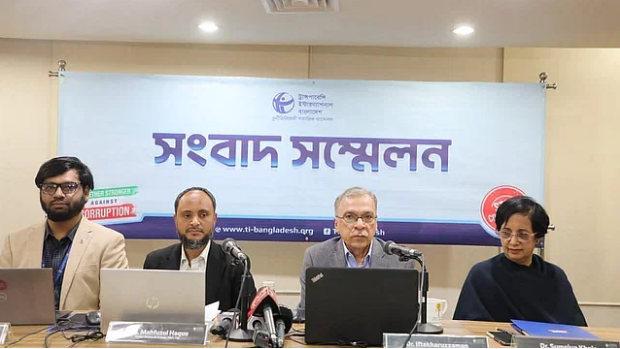Bangladesh News Desk: The 12th parliamentary election has been a one-sided and staged to look competitive one, Transparency International Bangladesh has said.
The organisation also said the election has not been fair and inclusive. This election is a bad omen for democracy and the future of democratic elections.
As a result of this election, the anti-graft body noted, Bangladesh will be considered as an international ‘test case’ in consideration of democratic decline experience and election strategy and bizarreness.
These were disclosed at a press conference on ‘the 12th parliamentary election process tracking’ at the TIB office in Dhanmondi in the capital on Wednesday.
TIB executive director Iftekharuzzaman presented observations over the election.
Although independent candidates were fielded to show the election competitive and inclusive, the election was not competitive in most of the seats, TIB said. The voting was not competitive in 241 constituencies.
TIB also said casting 41.8 per cent of votes including 15.43 per cent in the final hour of voting has given rise to a controversy.
Iftekharuzzaman in the written statement said one-sided election has been accomplished successfully to implement the strategy to stay in power.
The legitimacy of the election may not be challenged, he pointed out adding the success of this election in consideration of political integrity, democratic and ethical indicators will remain questionable forever.
The TIB chief said in the election there are preconditions including ensuring neutrality, level playing field and inclusiveness, but those were not reflected in the 12th parliamentary election.
The election has not been inclusive and fair as the two major political parties were rigid and divided over the election-time government.
The organisation said the hostage situation of democratic future of Bangladesh has escalated further in the fight of implementing ‘the agenda’ of an opposite and rigid stance.
TIB also said the election commission has played the role of catalyst to implement the ‘agenda’ of one-sided elections.
Other state organisations including law enforcing agencies and the administration have been used as the supportive role of the same ‘agenda’.
Research team members Mahfuzul Haque, Neoazul Mowla and Sazedul Islam presented the TIB report at the event. TIB adviser professor Sumaia Khayer and director Mohammad Badiuzzaman were present.

